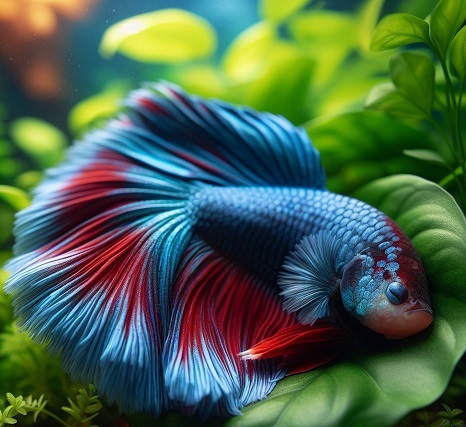Have you ever found yourself peering into your betta tank, and wondering if betta fish sleep or not? Well, the answer is yes. Betta fish sleeps, just like every other animal.
In this article, we will explain how betta fish sleeps, and every other thing you need to know about your betta’s sleeping habits.
How Long Do Betta Fish Sleep?
Betta fish do not have a specific number of hours they sleep like humans do. Instead, they are diurnal, which means that they are more active during the day and tend to rest during the night. This resting or sleep period is marked by reduced activity, which can vary from fish to fish. It’s also important to note that bettas don’t have eyelids, so it’s challenging to determine precisely when they are resting or sleeping.
Factors That Affect Betta Fish Sleep
- Lighting Conditions:
Bettas are sensitive to changes in light. Mimicking their natural habitat with a consistent day and night cycle helps regulate their sleep patterns.
- Tank Mates
The presence of other fish in the tank can impact betta sleep. Aggressive or overly active tank mates may disturb their rest.
- Water Parameters
The quality of water, including temperature and cleanliness, directly influences betta health and sleep. Maintaining optimal water conditions is crucial.
- Tank Setup
The design and structure of the tank can affect betta fish sleep. Providing hiding spots and comfortable spaces promotes a sense of security.
- Feeding Schedule
The timing and frequency of feeding can also influence betta sleep. A consistent feeding schedule helps regulate their metabolic activity.
How to Know if Your Betta Fish is Sleeping
Betta fish don’t have eyelids, so it can be challenging to know when they’re sleeping. Here are some subtle signs to look out for to know when your bettas are sleeping:
- Stationary Behavior: When they want to sleep, Betta fish tend to find a quiet spot and stay relatively still. This may be near the bottom of the tank, or on a plant or decoration.
- Reduced Movement: Bettas stop swimming during their resting periods. They won’t be as actively exploring their surroundings or chasing after food.
- Changes in Color: Some bettas may show changes in color when they are resting. They might appear slightly paler or darker, and their fins may be less spread out.
- Labored Breathing: While resting, bettas may exhibit slower and more rhythmic breathing. This is normal during periods of reduced activity.
It’s essential to note that these signs are general indicators, and individual bettas may exhibit variations in behavior. Also, if your betta is resting at the bottom of the tank, it’s crucial to ensure that it’s not due to stress or health issues.
Difference Between a Sick and a Sleeping Betta Fish
It’s quite difficult to differentiate between a sleeping betta fish and a sick one, as both situations may involve periods of reduced activity. Here are some signs to look out for, that will help you know if your betta is sick, or if it’s just sleeping:
- Breathing Patterns: A sleeping betta will have slow and rhythmic gill movement. It’s normal for their breathing rate to decrease during periods of rest. On the other hand, a sick betta will have labored or irregular breathing and rapid gill movement. Gasping at the water’s surface can also be signs of respiratory issues or illness.
- Response to Stimuli: A sleeping betta may be startled by gentle tapping on the tank or waving a hand nearby, and they should swim away. A lethargic or sick betta may not respond to stimuli, showing a lack of interest or energy.
- Color Changes: During rest, bettas may exhibit subtle color changes, but they will typically return to their normal vibrant colors when active. Sick bettas typically exhibit changes in color, such as paleness, dullness, or unusual spots.
- Positioning: A resting betta may choose to rest near the bottom, on a plant, or near the surface, but they should be capable of moving. You will know a sick betta from how it’s always lying on the bottom, floating uncontrollably, or tilting to one side.
- Eating Behavior: During rest periods, a betta may not be as interested in food, but they should resume normal feeding behavior when active. On the other hand, loss of appetite, refusal to eat, or difficulty swallowing can be signs of illness.
Ever wondered why your betta fish seems to be hitting the snooze button more often than usual? Let’s unravel the reasons behind their extended sleep cycles and explore the factors that can contribute to bettas catching extra Zs.
Why Do Betta Fish Sleep a Lot?
Betta fish, like many other animals, have natural cycles of activity and rest. While it might seem like bettas sleep a lot, they actually experience periods of rest or reduced activity. Several factors contribute to their sleeping behavior:
1. Environmental Stress
Changes in the tank environment, such as sudden fluctuations in temperature, lighting, or water quality, can stress bettas. Stress may lead to increased sleep as a coping mechanism.
2. Inadequate Tank Conditions
A poorly maintained or overcrowded tank can disrupt a betta’s natural behavior. If the tank lacks hiding spots or proper filtration, bettas may feel stressed, prompting them to seek refuge in extended sleep.
3. Health Issues
Underlying health problems, such as infections or parasites, can impact a betta’s energy levels. When unwell, bettas may opt for extended sleep as their bodies focus on recovery.
4. Age and Activity Levels
Young bettas and elderly individuals may have different sleep requirements. Additionally, bettas with lower activity levels might exhibit more prolonged periods of sleep.
5. Social Dynamics
The presence of tank mates can influence a betta’s stress levels. Aggressive tank mates or insufficient hiding spots can contribute to increased sleep as a means of avoiding potential conflicts.
6. Feeding Habits
Overfeeding or irregular feeding schedules may affect betta fish metabolism. Digestion requires energy, and an excess of food may prompt extended periods of rest.
7. Genetic Predispositions
Each betta fish is unique, and some individuals may naturally have longer sleep cycles. Genetic factors can influence their sleep patterns.
Conclusion
In conclusion, betta fish sleeps just like every other animal. Understanding their sleeping habits is a key aspect of responsible and attentive fish keeping. As we’ve delved into the intricate world of betta fish sleep, from their unique sleep patterns to the various postures they adopt, it’s evident that sleep is a vital component of their well-being.



